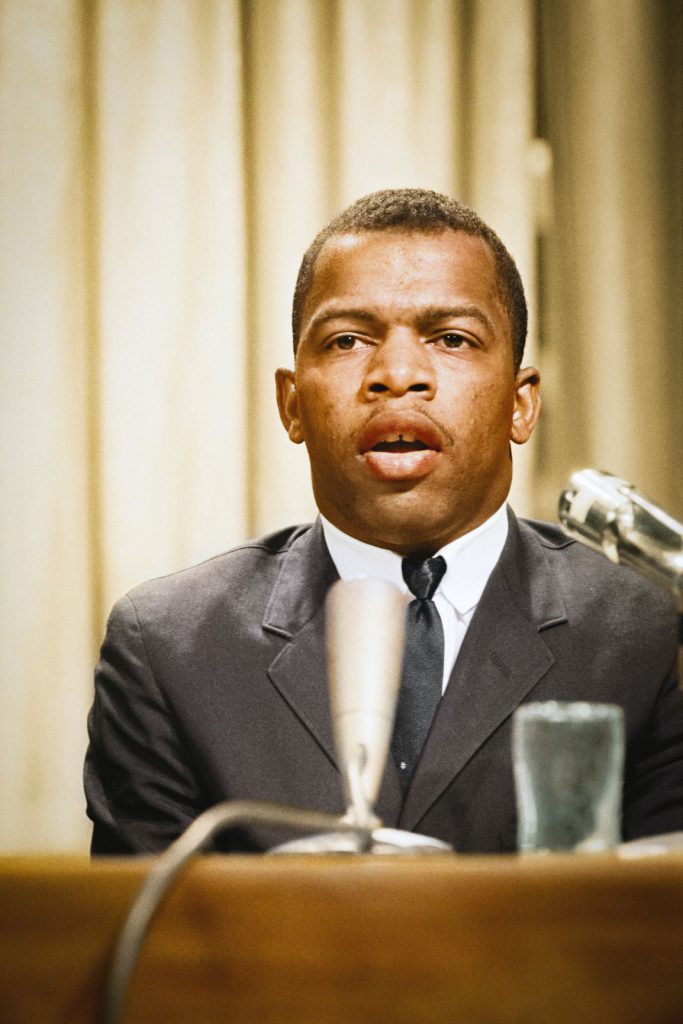Good Trouble: John Lewis and the Voting Rights Act
On August 6, 1965, the Voting’s Rights Act was signed into law after eleven years of consistent civil rights direct actions. While Black men were guaranteed the right to vote with the 14th and 15th amendments (1868 and 1870, respectively) and Black women in 1920, state officials and white vigilantes continued to deny this right to Black people with state statues such as the grandfather clause, literacy tests, poll taxes, and violence. State systems were key enforcers of Jim Crow, which was never just segregation but an attempt to deny Black people many rights afforded them by law.
Because of this long history of voter suppression, the Voting Rights Act banned the use of literacy tests, provided for federal oversight of voter registration in areas where less than 50 percent of the non-white population had not registered to vote, and authorized the U.S. attorney general to investigate illegal acts by states to deny the vote.
A major force in the fight for Voting Rights was Congressman John Lewis who passed away at the age of 81 on July 17, 2020. Like many compelled to act on behalf of justice, Lewis, when at the age of 15 he learned of the August 28, 1955 racist murder of 14-year-old Emmett Till in Money, Mississippi, began following Rosa Parks and Dr. King. He attended Fisk University in Nashville, Tennessee and at the age of 21, became a leader of the Freedom Riders movement which trained young people to engage in non-violent desegregation efforts. By age 23, he was a leader of the Student Nonviolent Coordinating Committee which focused on voting rights in the South. At that age, he was the youngest speaker at the now famous 1963 March on Washington. Importantly, it was in March of 1965, that John Lewis, along with Dianne Nash, Amelia Boynton Robinson, Viola Liuzzo, Annie Lee Cooper, Josea Hudson, and many more, marched across the Pettus Bridge to the State Capital in Selma. Lewis, said we must always make the Good and Necessary Trouble!
With the passing of John Lewis and the rise of new movements of young people challenging police killings of unarmed Black people, the defunding of Black schools and poor communities, and the prison industrial complex, we are reminded of the bravery of the young people who fought for civil rights. Like many young people today, the honorable John Lewis was jailed and attacked in the fight for justice. In fact, we are reminded of this sacrifice, as one of our own Kalamazoo College students, was unjustly arrested on Saturday August 14th, 2020 for using his voice to protest the white supremacist group, the Proud Boys, who invaded our city and beat up people that day.
Just as crucial is this: the Voting Rights Act was gutted by the US Supreme Court in 2013, and voter suppression is happening still today, from gerrymandering voting districts, shutting down polling stations, restructuring postal delivery, confusing the state rules for student voters, and removing hundreds of thousands of black people from the voter rolls. Join the movement to reinstate the Voting Rights Act – John Lewis Voting Rights Act.
The Faculty Advisory Board of the Arcus Center for Social Justice leadership and the HHMI Inclusive Excellence Faculty team present this monthly notice aimed at educating the K community on African-American history and culture. 19 marks 1619, the year in which the first set of African captives were brought to what would become the United States, and June 19th, 1865, the day that Blacks celebrate the end of enslavement in the US. Both of these dates, and their meanings, were largely unknown to many outsides of the Black community. We feel much of the “surprise” at recent uprisings led by the Black lives Matter movement derives from a lack of knowledge of the rich fabric of Black History. Thus, this month, and every month, hereafter, we will offer messages like this one to help better educate our College community as we work towards being an anti-racist Institution.
Regina Stevens-Truss, HHMI Inclusive Excellence + Chemistry department
Lisa Brock, ACSJL + History department

Voting Rights
Want to learn more about voting rights?
Visit the Kalamazoo College Library Voting Rights Resources Collection to find books on the topic.
Racist Performances and Incidents at K College.
The fight for voting rights is linked to a history of racism leading to many atrocities. Learn more about racist performances and incidents on our own campus. Disclaimer: This collection on the college’s digital archive includes disturbing photos.
See the Racist and Hate Incidents page on the K College digital archive.
Regina Stevens-Truss, HHMI Inclusive Excellence + Chemistry department
Lisa Brock, ACSJL + History department
